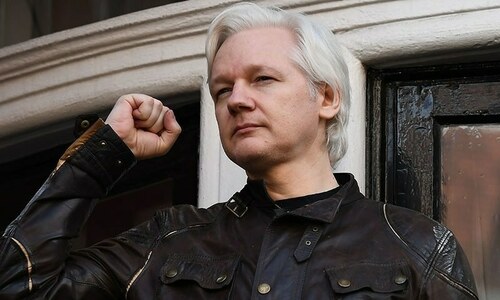LONDON: British Interior Minister Priti Patel on Friday approved the extradition of WikiLeaks’ founder Julian Assange to the United States to face criminal charges, bringing his long-running legal saga closer to a conclusion.
Assange is wanted by US authorities on 18 counts, including a spying charge, relating to WikiLeaks’ release of vast troves of confidential US military records and diplomatic cables which Washington said had put lives in danger.
Supporters of Assange vowed to fight his extradition to the US.
“This is a dark day for press freedom and for British democracy,” Assange’s wife Stella said. “We’re not at the end of the road here. We’re going to fight this. We’re going to use every appeal avenue,” Stella, who married the Australian publisher earlier this year, told reporters.
Assange’s lawyer, Jen Robinson, urged US President Joe Biden to drop the charges and called on the Australian government to press for her client’s release. “We will appeal this all the way through the British courts and if necessary to the European Court of Human Rights,” she added.
“In this case, the UK courts have not found that it would be oppressive, unjust or an abuse of process to extradite Mr Assange,” the Home Office said in a statement.
“Nor have they found that extradition would be incompatible with his human rights, including his right to a fair trial and to freedom of expression, and that whilst in the US he will be treated appropriately, including in relation to his health,” it added.
Originally, a British judge ruled that Assange should not be deported, saying his mental health meant he would be at risk of suicide if convicted and held in a maximum security prison. But this was overturned on an appeal after the United States gave a package of assurances, including a pledge he could be transferred to Australia to serve any sentence.
Patel’s decision does not mean the end of Australian-born Assange’s legal fight which has been going on for more than a decade and could continue for many more months.
He can launch an appeal at London’s High Court which must give its approval for a challenge. He can ultimately seek to take his case to the UK Supreme Court. But if an appeal is refused, Assange must be extradited within 28 days.
Nick Vamos, the former head of extradition at Britain’s Crown Prosecution Service, said Assange would be able to use new evidence, such as his allegations the CIA had plotted to assassinate him, and again challenge the extradition on grounds he originally argued, including its being politically-motivated.
The CIA has declined to comment on his allegations.
“I think he might get some traction,” Vamos said, adding that extradition verdicts were regularly overturned by the High Court.
WikiLeaks first came to prominence when it published a US military video in 2010 showing a 2007 attack by Apache helicopters in Baghdad that killed a dozen people, including two Reuters news staff.
It then released hundreds of thousands of secret classified files and diplomatic cables in what was the largest security breach of its kind in US military history.
US prosecutors and Western security officials regard Assange as a reckless enemy of the state whose actions imperilled the lives of agents named in the leaked material.
He and his supporters argue that he is being punished for embarrassing those in power and faces 175 years in prison if found guilty, although the US lawyers have said it would be more like four to six years.
“Allowing Julian Assange to be extradited to the US would put him at great risk and sends a chilling message to journalists the world over,” said Agnes Callamard, Amnesty International’s secretary general.
The legal saga began at the end of 2010 when Sweden sought Assange’s extradition from Britain over allegations of sex crimes. When he lost that case in 2012, he fled to the Ecuadorean embassy in London, where he spent seven years.
When he was finally dragged out in April 2019, he was jailed for breaching British bail conditions although the Swedish case against him had been dropped. He has been fighting extradition to the United States since June 2019 and remains in jail.
During his time in the Ecuadorian embassy he fathered two children with his now wife, who he married in Belmarsh high-security prison in London in March at a ceremony attended by just four guests, two official witnesses and two guards.
Published in Dawn, June 18th, 2022













































